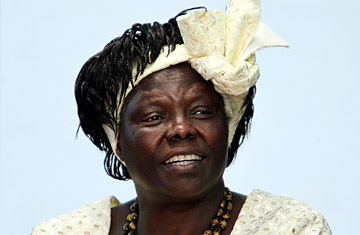
Nobel Peace Prize laureate Wangari Maathai
Environmentalism began as a religion. Certainly that's how paleo-greens like John Muir, founder of the Sierra Club, would have seen it. Muir was awakened to nature when he first explored Yosemite in the 1860s, and he felt it in a religious way — he called what would become one of the nation's first national parks "the grandest of all special temples of Nature."
Muir's biographer, Donald Worster, has written that Muir saw his mission as "saving the American soul from total surrender to materialism." David Brower, a spiritual successor to Muir who would found Friends of the Earth, would say of his staunchest green allies that they had "the religion." Environmentalism — rooted in nature and the outdoors — was an antidote to secular, technological modern life.
Except it's not quite that way anymore. As greens have pivoted to focus on climate change, the environmental movement has changed as well. It has become more wonky, focused on complex economic policies like cap and trade and new technologies like concentrated solar power. Its constituency has become more urban, more likely to be riding the subway than hiking the Sierra Nevada. The biggest event on the green calendar this year is the U.N. climate-change summit going on now in Cancún, Mexico, where international diplomats are jousting over protocols defining energy efficiency and technology transfer. Even one of the most promising subjects at Cancún — avoided deforestation, which allows tropical nations to be paid for keeping trees standing — turns a tree from something that should be valued for its own qualities into a living carbon bank. Not exactly romantic.
Wangari Maathai, for one, would like to change that. The Kenyan activist won a Nobel Peace Prize in 2004 — making her the first environmentalist to earn the award — for her work with the Green Belt Movement, a nonprofit that focuses on planting trees, conserving the environment and fighting for women's rights. Now Maathai has a new book called Replenishing the Earth: Spiritual Values for Healing Ourselves and the World, and she's preaching a green gospel. To Maathai, environmental work needs to be linked to spiritual values — and spiritual values should drive us to care about the environmentalism, contributing to what's called in Judaism tikkun olam, the healing of the world. "We've become detached from nature," Maathai told me recently during a trip to New York City. "And as you move away from nature, you become lost."
In her book, Maathai tells the story of how she began working for conservation in 1977, launching the Green Belt Movement. At the time her focus wasn't on religion or spirituality, though she grew up and was educated in the Catholic faith. Maathai wanted a practical way to help the rural women of Kenya with their basic needs: clean drinking water, food, energy for cooking and heating. Planting trees and restoring natural habitat was a way to achieve those practical goals. "I didn't think digging holes and mobilizing communities to protect or restore the trees, forests, watersheds, soil or habitat for wildlife that surrounded them was spiritual work," Maathai writes.
But over time, her feelings changed. She found what was driving those who joined the Green Belt Movement — and in time, what was driving Maathai herself — wasn't just about fixing material needs. It was about meeting something intangible within people. The poisoning of the earth, the destruction of the forest — Maathai came to believe that human beings could feel these losses. "If we live in an environment that's wounded — where the water is polluted, the air is filled with soot and fumes, the food is contaminated with heavy metals and plastic residues, or the soil is practically dust — it hurts us, chipping away at our health and creating injuries at a physical, psychological and spiritual level," Maathai writes. "In degrading the environment, therefore, we degrade ourselves."
Maathai came to understand, however, that the opposite is true as well. As we work to heal the earth, we heal ourselves as well. There's even an emerging field of treatment behind this — "eco-therapists" have begun prescribing nature walks and time spent outdoors for the depressed. The challenge is that we're growing more and more divorced from nature. Today more than half of the world's population now lives in cities, and even Maathai's largely rural Africa is becoming more and more urbanized, and more and more industrialized. "In Africa, we're busy trying to catch up with the West and live the same kind of life that we see on TV," says Maathai. "But we end up destroying the environment to get the things that we perceive as development."
As we learn to develop smarter, we can help avoid some of those problems — in fact, sustainable development is really at the heart of environmentalism today, as we attempt as a species to manage natural resources and grow without choking the planet. That need will only become more pressing in the age of climate change, which the world has so far failed to deal with — just look at the gridlock in Cancún. But Maathai is right when she points out that we can't forgo the natural connection that we feel for nature, even if we are becoming an urban animal. "A certain tree, forest or mountain itself may not be holy, [but] the life-sustaining services it provides — the oxygen we breathe, the water we drink — are what make existence possible," she writes. "The environment becomes sacred, because to destroy what is essential to life is to destroy life itself."
That's a religion that John Muir would recognize — and one we shouldn't surrender.
